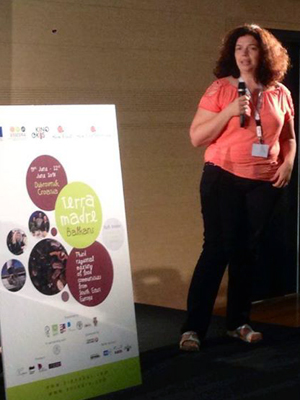The first forum of Slow Food and Terra Madre Bulgaria took place in Sofia. It was purposed to provide a spot for experience exchange of researchers, involved in the survey and protection of genetic resources, local communities’ representatives, small farmers and culinary experts, teachers and cooks. Those all shared knowledge on the diverse nutrition subject and the growing of different crops.
Slow Food is an international movement, established in 1986 in Italy by Carlo Petrini. Its mission is to preserve local gastronomic traditions, to encourage the growing of local crops and farm animals and also to support local communities. Over 130 countries worldwide have joined the movement. Its start was due to a protest against the opening of new fast food restaurants.
Good, Clean and Fair – that is the slogan of Slow Food. It shouldn’t harm nature, it should be tasty and it should guarantee fair relations between the producer and consumer. The first receives his adequate price and the latter gets one that is not too high.
Plant diversity serving the community – that was the subject of the conference which opened the forum. The lecturers got the audience acquainted with the endangered plant species and with the process of growing and preservation of cultures. Associate Prof. Desislava Dimitrova, a Bulgarian Academy of Sciences (BAS) expert in botany gives us more details on the mission of Slow Food and Terra Madre, as she is the coordinator of the movement for Bulgaria:
 “Unfortunately today we tend to consume more for the sake of consumption itself. We shouldn’t talk about the production of more food. We must change the distribution of this food, changing the food system, as it is only profit-based right now. Food is turned into a bunch of goods, emptied in terms of its biological, cultural and social content. Advertisements prompt that we should buy a lot of cheap food. We tend to use less and less our palate, emotions and knowledge. We just swallow the food. Our idea is to slow down the pace in terms of working and consumption, as right now we are nothing more than homos-consumentos. However, a good example is always an option. There has been a growing trend in Bulgaria over the recent years towards the search for foods of a good quality and a growing number of young people, especially young parents get really interested in what they put on the table. The bad thing is the lack of a state policy on food diversity. People are heading towards the industrialization of food, as this is the easier path. We are an organization of volunteers, of people, united by a common cause and passion. This is something more than a job, it simply makes you follow it. The future of Slow Food lies in the connection between science and the people, involved in practice.”
“Unfortunately today we tend to consume more for the sake of consumption itself. We shouldn’t talk about the production of more food. We must change the distribution of this food, changing the food system, as it is only profit-based right now. Food is turned into a bunch of goods, emptied in terms of its biological, cultural and social content. Advertisements prompt that we should buy a lot of cheap food. We tend to use less and less our palate, emotions and knowledge. We just swallow the food. Our idea is to slow down the pace in terms of working and consumption, as right now we are nothing more than homos-consumentos. However, a good example is always an option. There has been a growing trend in Bulgaria over the recent years towards the search for foods of a good quality and a growing number of young people, especially young parents get really interested in what they put on the table. The bad thing is the lack of a state policy on food diversity. People are heading towards the industrialization of food, as this is the easier path. We are an organization of volunteers, of people, united by a common cause and passion. This is something more than a job, it simply makes you follow it. The future of Slow Food lies in the connection between science and the people, involved in practice.”
Desislava Dimitrova commented the idea of the healthcare ministry for the implementation of a “harmful food” tax like that:
“I don’t think that’s necessary. The price of cigarettes is constantly on the rise and we don’t see any bankrupted producers, neither have people stopped smoking. This only demonstrates some engagement. The law for sure won’t do any harm to a large fast food chain, but will hurt a small producer with some “harmful” food included in his business, according to the law.”
English version: Zhivko Stanchev
The Varna Regional Library "Pencho Slaveykov" has acquired a humanoid robot. It was unveiled by the library's director, Radka Kalcheva, during the celebration of the 20th anniversary of the library's American Corner, in the presence of Eric Brasel, the..
1000 participants will take part in the first Burgas Half Marathon, which will take place this Sunday, 24 November. The event will bring together amateurs and professionals of different ages who will compete in three distances - 1 km, 10.5 km and 21 km...
Two graduates of the Bulgarian School "Saints Cyril and Methodius" in Jordan presented their achievements at an event at their school "Hadi al Muhammadi" in Amman. The photo, published on the Bulgarian school's Facebook page , shows third graders..
According to the Annual Report on the Health Status of Bulgarian Citizens for 2023, t he main cause of death in Bulgaria is diseases of the..
At the Bulgarian Embassy in London, Prof. Bettany Hughes presented excerpts from the new BBC series - Wonders of Bulgaria. Prof. Bettany..
Over 3.5 million Ukrainians have arrived in or passed through Bulgaria since the beginning of the war. Nearly 200,000 people have found temporary..

+359 2 9336 661
